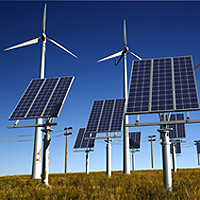 The UNECE region accounts for nearly half of global renewable energy capacity. The potential for developing renewable energy technology is growing and renewable energy is integrating progressively into the energy mix. Nevertheless, in many UNECE member States renewable energy policies do not work well and more can be done to develop suitable frameworks on how to “do renewable energy right” from a systems perspective.
The UNECE region accounts for nearly half of global renewable energy capacity. The potential for developing renewable energy technology is growing and renewable energy is integrating progressively into the energy mix. Nevertheless, in many UNECE member States renewable energy policies do not work well and more can be done to develop suitable frameworks on how to “do renewable energy right” from a systems perspective.The UNECE’s Group of Experts on Renewable Energy is exploring ways to enhance the uptake of renewable energy.
The Group begun its work in 2014 by identifying and filling information gaps to establish a baseline for future activities. The exchange of information on best practices intends to help countries in their work to deploy renewable energy in the future. In addition, the Group is examining the interaction of intermittent renewables with fossil fuels, particularly natural gas, to ensure quality of service and within a systematic approach.
The current work of the Group of Experts in the UNECE region continues in this direction through the three main pillars of activities of its Work Plan 2020-2021:
- Tracking progress in the uptake of renewable energy sources;
- Exchange of experiences, good practices and multi-stakeholder dialogues on how to help significantly increase the uptake of renewable energy; and
- Cross-cutting cooperation to strengthen integration of renewable energy in future sustainable energy systems.
Overall, investments in renewable energy will be a key factor in reducing the carbon intensity of the energy sector in the UNECE region. To undertake the right path, it is essential to understand the starting point and the challenges by improving the quality of data, by identifying the right indicators, and by preparing tracking systems to tackle the required changes.
The REN21 UNECE Renewable Energy Status Report was prepared together with REN21 and in close cooperation with IEA and was launched during the 8th International Forum on Energy for Sustainable Development in Astana in June 2017COP21 Climate Conference in Paris on 7 December 2015 to contribute to this understanding. This report represents a comprehensive overview of the renewable energy infrastructure, industry, policy, regulations, market development and potential growth rates in 17 selected countries of the UNECE region. It is a very timely report, coming few months after the adoption of the 2030 Agenda for Sustainable Development with its Goal 7 on ensuring access to affordable, reliable, sustainable, and modern energy for all. UNECE - through its Committee on Sustainable Energy and the Group of Experts on Renewable Energy - will continue to assist member States with specific activities to achieve the objectives of the 2030 Agenda and of the landmark agreement adopted at COP21.